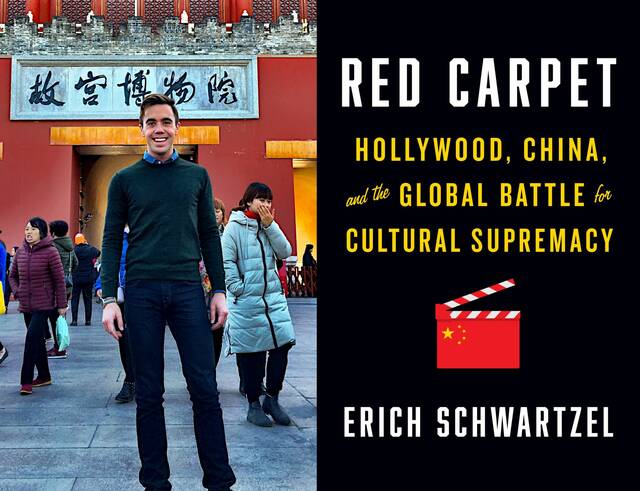Trib Total Media TV writer Rob Owen offers a viewing – or TV adjacent — tip for the coming week.
Former Pittsburgh journalist Erich Schwartzel probably shouldn’t expect China to roll out the red carpet once its political leaders get their hands on a copy of his first book, “Red Carpet: Hollywood, China and the Global Battle for Cultural Supremacy.” It’s due in bookstores Tuesday ($28, Penguin Press), timed for release when China will be in the cultural conversation due to the Winter Olympics in Beijing.
A Unity native who is now based in Los Angeles covering the movie industry for The Wall Street Journal, Schwartzel saw the impact of China on Hollywood in his daily work and decided to take a deeper dive into the recent history of Hollywood-China tensions.
The result is a fascinating read that is both a history book and also a cultural guide to what the Chinese government will tolerate in imported entertainment (and mostly what it won’t).
Filled with telling anecdotes gathered in his four reporting trips to China in 2019 and 2020, Schwartzel finds an ascendant Chinese entertainment industry at a time when Hollywood’s global influence has plateaued.
“When I took this job [at the Journal in 2013] and started writing about Hollywood and then Hollywood in China, it felt like I was writing about two worlds that can feel very far away for a lot of people,” Schwartzel, a 2005 Greater Latrobe High School grad, said in a January interview. “No matter what beat I have, I find myself often thinking about how can I make this relevant to people who don’t think they care about it. And if you’re living in Western Pennsylvania or any part of the country outside of Los Angeles, you might think that what goes into making a movie doesn’t affect you. But we all go to the movies. And we all see images that are influenced by China or any other force. And so I always have thought, if I can make it relevant to readers who feel like this is another planet that doesn’t concern them, I can make it relevant to everyone.”
In one portion of the book, Schwartzel interviews Wei Zhang, then the Los Angeles-based president of China’s Alibaba Pictures, who grew up in China before she attended college at Greensburg’s Seton Hill University. It gives Schwartzel an opportunity to mention Westmoreland Mall in “Red Carpet.”
“I could have just said she was going to the local mall but I thought, even if I’m the only one who notices, I need to have a little shout-out for all the time I spent there,” Schwartzel said.
“Red Carpet” supports a notion advanced in the 2002-03 Fox sci-fi series “Firefly,” which depicted a future that’s influenced equally by English and Chinese culture.
To show China’s relatively newfound influence globally, Schwartzel traveled to Kenya where Chinese companies bestow low-cost satellite dishes on the locals in an effort to spread China’s influence.
“I would hear from a lot of people in Hollywood that, ‘Yeah, China’s growing, but Americans are never going to go and see a big Chinese blockbuster.’ And I thought that in those statements, there was a complacency, a bit of a myopic view of the world,” he said, “because there are more markets than just the U.S.”
Schwartzel interned at the Tribune-Review in 2007 and was a business writer at the Pittsburgh Post-Gazette from 2009 through 2013. He contrasts China’s influence with the recent import of South Korean culture in the U.S., from K-Pop music to the movie “Parasite” and global Netflix hit “Squid Game.” Schwartzel points out that “Squid Game” would never originate in China because it’s too violent and its commentary on class issues would be a non-starter for Chinese governmental officials who oversee what does and doesn’t make it onto Chinese screens of all sizes.
In American TV and movies, dissent from authority demonstrates freedom and openness, but that’s not a message China’s leadership encourages. Just last month, a Chinese streaming service aired the 1999 film “Fight Club” but cut the film’s anarchic ending, replacing it with a title card explaining a bombing plot was foiled by authorities.
“Korea is really doing what China wants [to do],” Schwartzel said. “The big question that China’s state-backed entertainment system will face is will they be able to distribute movies and TV shows that don’t feel too manufactured by the government or that go down like medicine. That’s why it’s interesting to see in some markets China is paying to close the gap by putting them on low-cost satellite dishes or paying to dub [shows into a local language] even though it doesn’t really make economic sense to do so. I think it does sound like ‘Firefly’ got it right in one respect: There is a very plausible scenario where 50 years from now China’s money and power is influencing things far beyond entertainment.”
In “Red Carpet,” Schwartzel contrasts the American approach to exporting democracy, offering aid with strings attached around upholding human rights and democratic ideals, with China’s more pragmatic aid that helps a country immediately, whether it’s building railroads or exporting food. As Ezekiel Mutua, the politician in charge of Kenya’s Film Classification Board, puts it in “Red Carpet” – “People don’t eat freedom.”
For decades it’s been possible to see the influence of Hollywood at home and abroad through the images that movies and TV shows relay. Look no further than how American acceptance of gay marriage rose from the time “Will & Grace” first aired on NBC in 1998 and when it ended its second run in 2020, five years after the U.S. Supreme Court made same-sex marriage legal nationwide.
“Some readers will point out that America has had a lot of success with changing hearts and minds through the movies. What China’s doing, we’ve done ourselves, and I think that’s true to some extent,” Schwartzel said. “But one major difference is I can’t recall a time where America didn’t allow a story to be told on screen the way that China’s system polices anything that it deems is out of hand.”
That policing now results in self-censorship by Hollywood entertainment conglomerates eager to get their movies and TV shows seen in the world’s second-largest economy (behind the U.S.). And it’s why perceived slights to the Chinese people can cause such headaches for Western entertainment executives. (A sample headline from Variety last month: “Chinese Nationals Rage at Keanu Reeves Over Tibet Stance, Threaten ‘Matrix’ Boycott.”)
Are these American companies ditching American values of freedom of expression and speech in favor of profit?
“A lot of these companies don’t see themselves as American companies entirely,” Schwartzel said. “These companies are global entities. And [they] have to worry not just about keeping politicians in Washington happy but politicians in all countries. … The revenue opportunities in China are still too great to pass up and the pressure from shareholders going for higher and higher returns is not going anywhere either.”
Schwartzel said he and his publisher are shopping the rights to “Red Carpet” to see if any filmmaker wants to make it into a documentary, although that could be a tough sell to any media conglomerate that does business in China. He’s not sure what languages the book may be translated into.
“I’m hoping it goes far and wide,” he said. “Certainly there are elements of this book that China doesn’t like to talk about. On the other hand, I hope it opens a lot of eyes that China has almost overnight built an incredibly powerful and robust competitor to Hollywood.”








